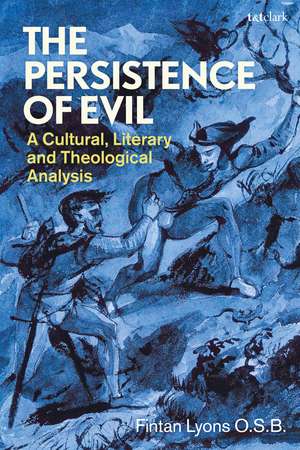The Persistence of Evil: A Cultural, Literary and Theological Analysis
Autor Revd Fintan Lyons O.S.B.en Limba Engleză Paperback – 20 sep 2023
| Toate formatele și edițiile | Preț | Express |
|---|---|---|
| Paperback (1) | 170.54 lei 3-5 săpt. | +50.04 lei 7-13 zile |
| Bloomsbury Publishing – 20 sep 2023 | 170.54 lei 3-5 săpt. | +50.04 lei 7-13 zile |
| Hardback (1) | 471.45 lei 6-8 săpt. | |
| Bloomsbury Publishing – 20 sep 2023 | 471.45 lei 6-8 săpt. |
Preț: 170.54 lei
Preț vechi: 195.29 lei
-13% Nou
Puncte Express: 256
Preț estimativ în valută:
32.64€ • 33.88$ • 27.21£
32.64€ • 33.88$ • 27.21£
Carte disponibilă
Livrare economică 01-15 martie
Livrare express 15-21 februarie pentru 60.03 lei
Preluare comenzi: 021 569.72.76
Specificații
ISBN-13: 9780567710116
ISBN-10: 0567710114
Pagini: 384
Dimensiuni: 156 x 234 x 20 mm
Greutate: 0.58 kg
Editura: Bloomsbury Publishing
Colecția T&T Clark
Locul publicării:London, United Kingdom
ISBN-10: 0567710114
Pagini: 384
Dimensiuni: 156 x 234 x 20 mm
Greutate: 0.58 kg
Editura: Bloomsbury Publishing
Colecția T&T Clark
Locul publicării:London, United Kingdom
Caracteristici
The transition from belief in Satan to personification of evil in historical regimes and characters brings contemporary culture into sharp focus
Notă biografică
Revd Fintan Lyons O.S.B. is a Senior Monk at Glentsal Abbey, Ireland. He taught in the Pontifical Liturgical Institute and in the Angelicum University, Rome, in M.I. College, Limerick University, in Beeson Divinity School (Southern Baptist), Birmingham Al. and was a member of the International Pentecostal-Roman Catholic Dialogue.
Cuprins
IntroductionChapter 1: TheodicyChapter 2: Doing Theodicy while Talking of EvilChapter 3: Does the Devil Exist? A Persistent Belief Chapter 4: The Representation of Satan up to the ReformationChapter 5: The ReformationChapter 6: The Catholic Reform and the Struggle with SatanChapter 7: The Devil in the Era of Modernity Chapter 8: Twentieth-Century Chronicles of EvilChapter 9: Exorcism. Preliminary Considerations Chapter 10: Toward a theological and psychological analysis of the Rite of Exorcism Chapter 11: Concluding ReflectionsBibliographyIndex
Recenzii
As enlightening as it is engaging, this book is a masterful survey of the toughest of all subjects. Fintan Lyons not only surveys the ways in which Christians and Western thinkers have wrestled with the problem of evil for two millennia, but also wrestles gracefully with the theological, philosophical, ethical, and pastoral questions raised by it.
Books that examine evil and Satan are usually doing different things, with the former striving to produce a theodicy that is not always rooted in religion or Christian theology while the latter are usually of a popular sort and rarely helpful. The Persistence of Evil, which examines the history of belief in the existence of Satan from a wide variety of perspectives and genres, is not something easily found on one's bookshelf and is an excellent study. Fintan Lyons' sources are interdisciplinary, making the book attractive to readers and scholars from a range of backgrounds and areas of expertise. In light of the recent pandemic and the war in Ukraine, questions on the origin and nature of evil remain timely, making this book appealing to a wide audience.
Through the eyes of theologians, mystics and great literary figures, Fintan Lyons has given us a magisterial survey of the human struggle with evil down the ages. Of particular interest is his wide-ranging study of demonology and the practice of exorcism.
At the heart of Christian prayer is the invocation to be delivered from evil. Yet how many of us know what we are praying about? There is hardly a more thorough yet accessible account of evil than Lyons'. Multidisciplinary in its approach, his magnificent mapping of the mystery of evil exemplifies how good theology, in dialogue with historical and literary sources as well as the human sciences, can illuminate a core aspect of human experience. The soundness of Lyons' scholarship means that this book will be of interest to believer and non-believer alike. It should be a key textbook in all courses that seek to unfold the Catholic Intellectual Tradition for contemporary students.
Books that examine evil and Satan are usually doing different things, with the former striving to produce a theodicy that is not always rooted in religion or Christian theology while the latter are usually of a popular sort and rarely helpful. The Persistence of Evil, which examines the history of belief in the existence of Satan from a wide variety of perspectives and genres, is not something easily found on one's bookshelf and is an excellent study. Fintan Lyons' sources are interdisciplinary, making the book attractive to readers and scholars from a range of backgrounds and areas of expertise. In light of the recent pandemic and the war in Ukraine, questions on the origin and nature of evil remain timely, making this book appealing to a wide audience.
Through the eyes of theologians, mystics and great literary figures, Fintan Lyons has given us a magisterial survey of the human struggle with evil down the ages. Of particular interest is his wide-ranging study of demonology and the practice of exorcism.
At the heart of Christian prayer is the invocation to be delivered from evil. Yet how many of us know what we are praying about? There is hardly a more thorough yet accessible account of evil than Lyons'. Multidisciplinary in its approach, his magnificent mapping of the mystery of evil exemplifies how good theology, in dialogue with historical and literary sources as well as the human sciences, can illuminate a core aspect of human experience. The soundness of Lyons' scholarship means that this book will be of interest to believer and non-believer alike. It should be a key textbook in all courses that seek to unfold the Catholic Intellectual Tradition for contemporary students.
